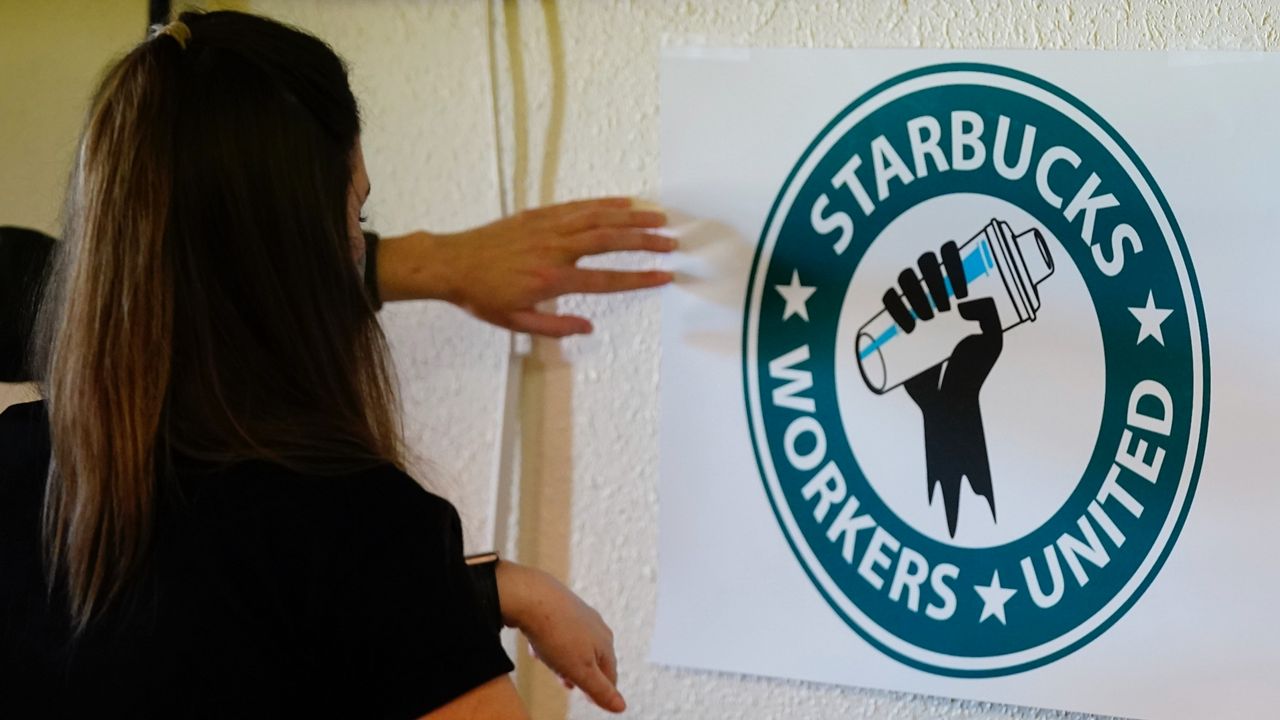Starbucks Workers Untied (SBWU), the burgeoning union representing Starbucks employees nationwide, accused the coffee chain of unfair labor practices in a filing submitted to the National Labor Relations Board, alleging the company retaliates against pro-union workers by cutting their hours.
News of the filing was first reported by More Perfect Union, a progressive non-profit media outlet dedicated to promoting the American labor movement.
According to the complaint, workers have faced reductions of anywhere from two to 15 hours a week, alleging that full-time workers have lost about one day of work a week, while many part-time workers have been cut to one shift a week. In a news release, the union said it fears that workers might lose eligibility for benefits dependent on hours worked, including health care coverage and tuition coverage.
Starbucks employees "must be paid a minimum of 520 hours (an average of 20 hours per week) during each six-month measurement period" in order to be eligible for benefits, according to the company.
“Starting within the six months preceding the filing of this charge, in at least 20 states nation-wide, including Arizona and Texas, Starbucks Corporation has reduced employee hours in order to discourage and/or punish Section 7 protected union activity,” reads the unfair labor practice charge filed by Workers United, SBWU’s parent union. “These hours cuts are in swift response to workplace organizing campaigns at Starbucks stores around the country.”
The National Labor Relations Act states that workers have the right to form, join or assist a union, and that management must allow workers to do so freely, without spying, threats, discipline, demotions, penalties or firing workers trying to organize a union.
According to a spokesperson for SBWU, the union conducted interviews with workers nationally in gathering its evidence. The union also alleges that worker schedules are being changed after they were supposedly finalized and that workers are being sent home before the end of their shift if the store isn’t busy.
The union acknowledges that worker hours are typically trimmed in the post-holiday months of January and February, but says that these reductions go well beyond the norm.
“In the eight years I’ve worked for Starbucks, I’ve never seen the company slash hours this severely or this widely,” Sarah Pappin, a shift supervisor in Seattle, said in the release. “Many of my coworkers have no idea how they’re going to pay rent for April…my husband and I have been saving up to start our family. I have no idea how that’s going to happen now when my hours have been reduced by 32 percent.”
Union activity at Starbucks stores has grown sharply since workers at a store in Buffalo, New York, became the first in the United States to win a union election last year. Since then, five more stores have successfully unionized, and more than 130 have at least announced an intent to form a union.
Starbucks' has been opposed to unionization at its shops, but has expressed willingness to come to the table on negotiations.
"From the beginning, we’ve been clear in our belief that we do not want a union between us as partners, and that conviction has not changed," Rossann Williams, executive vice president, president North America for Starbucks, wrote in a letter to the company's employees, whom the company refers to as "partners," at the end of last year following the Buffalo unionization vote.
"However, we have also said that we respect the legal process," Williams continued. "This means we will bargain in good faith with the union that represents partners in the one Buffalo store that voted in favor of union representation. Our hope is that union representatives also come to the table with mutual good faith, respect and positive intent."
On Tuesday, the NLRB issued a complaint in response to concerns of unfair labor practices at a Phoenix-area Starbucks. The union alleged that Starbucks management unfairly disciplined pro-union workers by suspending them, cutting hours, and — in one case — firing a worker. It also alleged that a district manager “engaged in surveillance of employees engaged in union and protected concerted activities.”
The NLRB’s complaint seeks “all relief as may be just and proper,” including reimbursement for the fired worker. A hearing for the complaint has been set for June 14.
"If you want to understand why the movement to organize unions at Starbucks is spreading like wildfire, look at how the company is treating workers demanding a voice on the job," Vermont Sen. Bernie Sanders, a powerful progressive voice in Congress., wrote on Twitter in response to the NLRB's complaint. "Starbucks is not a poor company. It should stop retaliating and allow workers to organize."
A spokesperson for Starbucks called the union’s complaints “categorically false" and said the company has been working within the bounds of the National Labor Relations Act. The spokesman added that the company has "been consistent in denying any claims of anti-union activity."
“We’re not cutting hours, and it’s not specific to union members,” said spokesperson Reggie Borges. He said that the company does often respond to post-holiday customer behavior by trimming worker hours, and that COVID’s omicron variant forced some stores to reconfigure their hours, but that anti-union retaliation has not played a role in decision-making.
Spectrum News has reached out to Starbucks for further comment.





